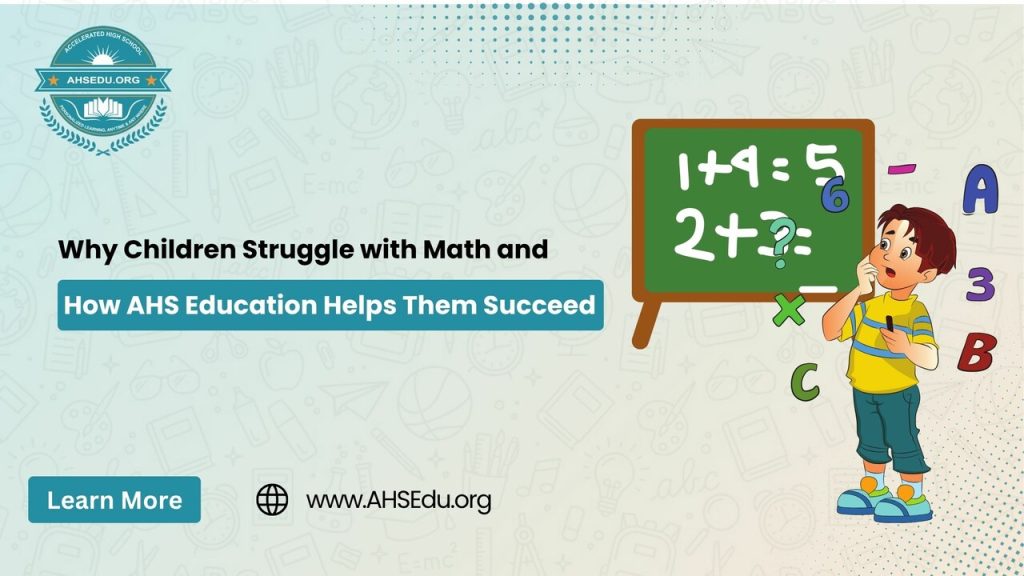
Mathematics can be hard for young learners for many reasons. Some children have a true math learning disability, known as developmental dyscalculia, which affects roughly 5–7% of kids. These children often have poor number sense and trouble recalling math facts (even struggling with simple multiplication or fractions). In fact, many students with math difficulties also have other learning challenges: about 40% of those with math disabilities also have a reading disability, and 25–42% have ADHD. Beyond disabilities, gaps in foundational skills are a common cause. For example, educators note that many elementary students lack basic number sense and arithmetic fluency because they haven’t practiced enough. In one account, only about 71% of Grade 3 students met standards, a shortfall partly attributed to 4 out of 5 teachers having little math training. This “missing basics” problem means older kids often forget how to do simple math, hurting their confidence.
Other factors can make math hard. Research shows that math anxiety is very common: across many countries, roughly 30–60% of students report feeling nervous or tense about math. In fact, 20–25% of children experience significant math anxiety, which can create a vicious cycle – anxiety makes learning math harder, and struggling in math increases anxiety. Environmental issues also matter: frequent absences, changing schools, a non-native language, or stress at home can all impede math learning. When you combine all these issues, the result is telling: in a recent assessment, about 36% of general education 12th-graders scored below basic in math, a number that jumped to 75% for students with learning differences.
Key reasons children struggle with math include:
• Learning disabilities (Dyscalculia): A biologically based math learning disorder affecting ~5–7% of children, making concepts like number sense, multiplication, fractions or decimals very hard to grasp. Children with dyscalculia often rely on fingers to count and have trouble storing/retrieving math facts.
• Other learning challenges: Many kids with math struggles also have dyslexia or ADHD. These conditions (or visual/auditory processing issues) can indirectly make math harder by interfering with attention or the way problems are presented.
• Poor foundations: Gaps in basic skills (like number patterns, arithmetic facts, place value) are huge hurdles. Without solid practice of simple addition, subtraction, multiplication, etc., students can’t keep up with higher math. Some educators blame an overemphasis on “inquiry” methods without enough drill; students learn the logic of math but forget how to actually compute.
• Math anxiety and mindset: Feeling worried or “not a math person” is common. Studies find that a majority of students report anxiety-related statements about math (e.g. feeling tense or helpless during math homework). This anxiety (affecting ~20–25% of kids) directly impairs performance. Negative attitudes can become self-fulfilling: if children hear “I was bad at math,” they may adopt that mindset.
• Environmental factors: Outside issues like missing school, changing schools, language barriers or problems at home can disrupt math learning. Even things like virtual learning during the pandemic have challenged many students. When learning is inconsistent or stressful, children fall behind in math understanding.

These challenges mean many children fall behind in math. The good news is that research also points to what helps. For example, evidence shows that personalized, self-paced learning leads to real gains: students in personalized-math programs improve significantly more in math scores than those in traditional classrooms. In fact, a large RAND study found that K–8 students in personalized learning environments saw faster growth in math achievement. Tailored approaches – which adapt to a child’s pace and style – help kids master foundational skills before moving on.
How AHS Education Supports Math Success
AHS Education is designed to address these exact issues. As a free, interactive online learning platform for 1–5, AHS offers a personalized math curriculum built by certified educators. Every child progresses at their own pace through short, engaging video lessons and exercises. This means a student who is struggling can spend extra time on basic concepts (building number sense and arithmetic fluency), while more advanced students can move ahead without boredom. Because AHS is aligned to US state standards, the content is rigorous and comprehensive (covering math, English, science, etc.), and designed to fill in any learning gaps.
Key features of AHS Education that help struggling math learners include:
• Self-Paced, Personalized Learning: AHS creates a unique learning path for each child. Students work through lessons and practice problems at a pace that suits them. Research suggests this approach boosts math achievement, because learners only move on once they fully master a concept. As one parent tip points out, personalized math resources (like fun video lessons and targeted drills) help struggling students by engaging their learning style. AHS’ system embodies that advice.
• Engaging Video Lessons and Practice: Instead of dry textbooks, AHS uses interactive video lessons that incorporate games and real-life examples. Each lesson has embedded quizzes and provides over 100 practice questions per skill. This approach keeps children motivated and gives them the repetition they need to solidify basics (addressing the “lack of practice” problem). Worksheets and printable exercises reinforce learning, and kids earn achievement badges for progress, which builds confidence.
• Certified-Teacher Curriculum: All AHS content is designed by experienced teachers and child education experts. This ensures high-quality explanations and strategies, even for students with learning differences. The program explicitly addresses common stumbling blocks (for example, providing clear instruction on place value or fractions). In effect, AHS offers the individualized attention that struggling kids often need – a feature usually only available in small schools or tutoring programs.
• Progress Tracking and Support: AHS gives parents and tutors a clear dashboard of each child’s progress. Easy-to-read reports show which skills are mastered and which need work. This transparency lets adults intervene early (e.g. if a child is skipping a key concept). Many struggling students benefit from knowing exactly where they stand and celebrating small wins, which AHS facilitates with its system of feedback and badges.
• Flexible, Accessible & Free: AHS is built for real families. It is self-paced and online, so it fits any schedule (homeschool, after school, etc). Importantly, AHS provides a free trial and scholarships so families can use the full curriculum at no cost. There is no credit card needed and no commitment. This removes financial barriers, allowing any child who struggles to get help immediately.
By combining these elements, AHS directly tackles the hurdles we identified: students get the repetition and fundamentals they missed (through practice and review), the self-paced format reduces anxiety by allowing mastery at a comfortable speed, and the engaging multimedia lessons hold attention. In short, AHS offers the kind of personalized math support that experts say struggling students need. And the results speak for themselves: as one learning guide notes, when kids fill their knowledge gaps and build confidence with fun, supportive teaching, they make 100% mastery possible.
All evidence suggests that with the right support, most children can overcome early math challenges. AHS Education provides that support through its adaptive learning platform. By signing up for AHS, parents give their child unlimited access to tailored instruction and practice – effectively turning frustration into mastery. AHS’ free, high-quality curriculum is a best-fit solution for kids who struggle in math, building confidence and competence where it’s needed most.
For parents looking to help their child now, AHS Education offers a 3-month free trial with no credit card required. There’s nothing to lose – just a chance for your child to experience personalized math learning and finally catch up to grade level. Sign up at AHS for free today and give your child the tools to succeed in math.

AHSEDU.org offers personalized learning for every student. With a curriculum standardized with USA State Standards, Free interactive videos, Fun and interactive learning content, Constructive assessments, and take-home worksheets we address the unique educational needs of each learner to ensure success.